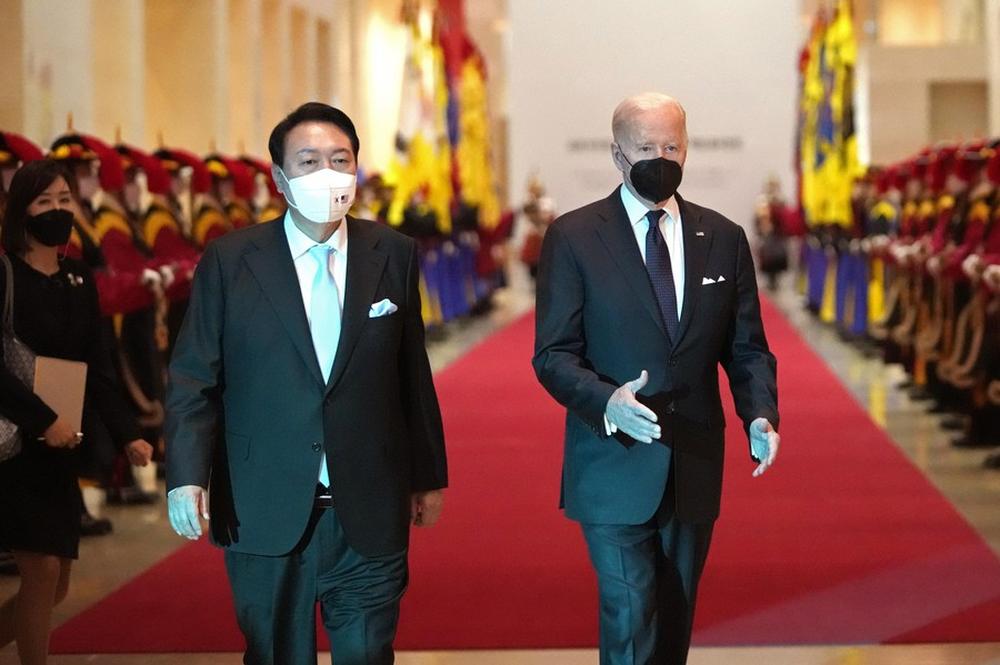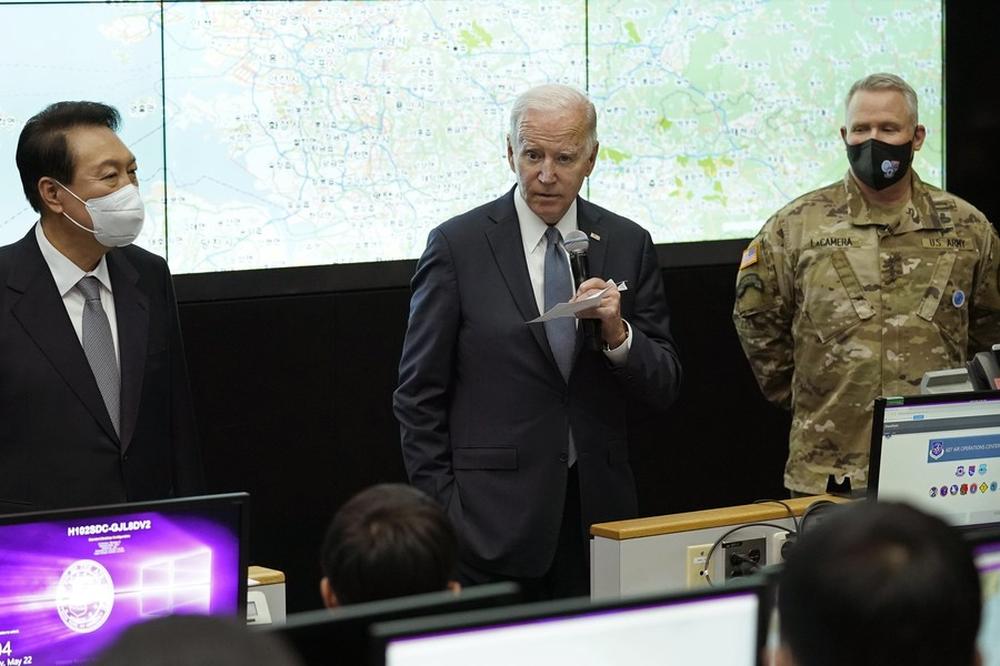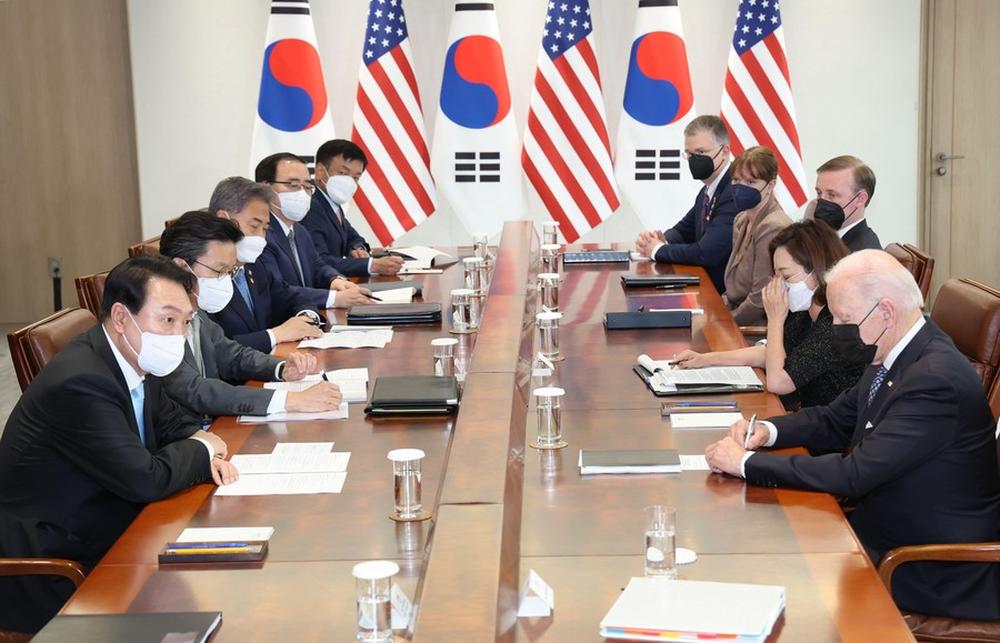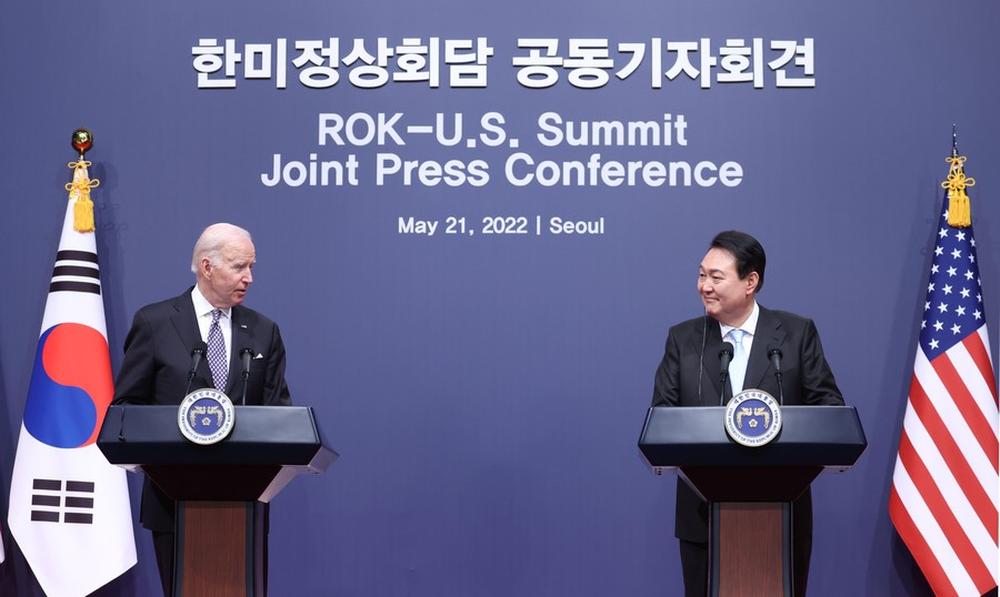- #Global Issues
- #Nuclear & Missile Issues
- #South Korea
- #US Foreign Policy
- #US-ROK Alliance
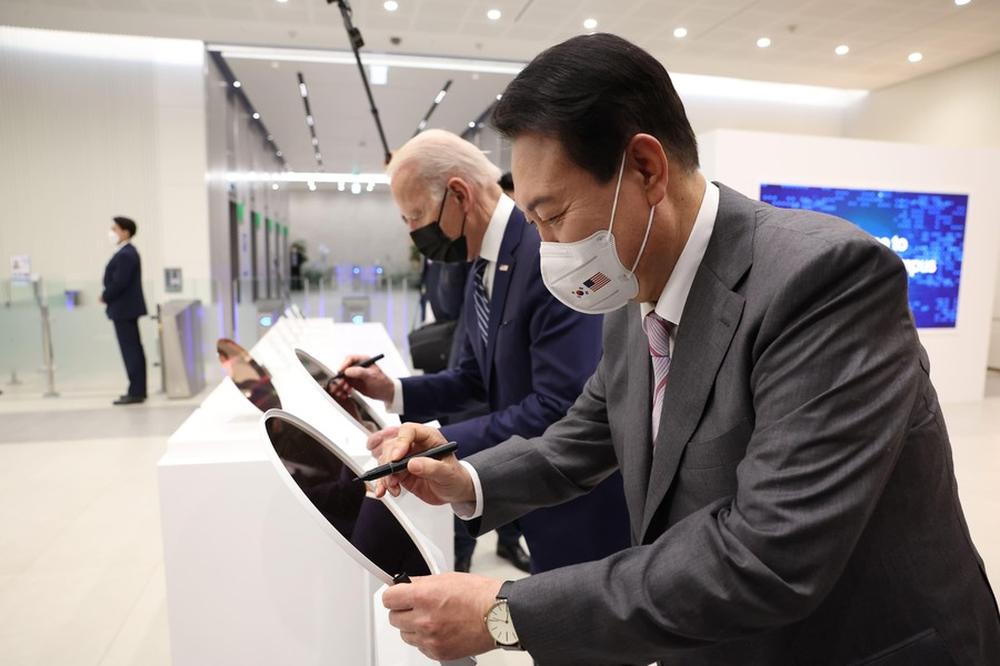
▸ Presidents Biden and Yoon reaffirmed their commitment to the defense of South Korea and security cooperation under the mutual defense treaty.
▸Another change in the bilateral relationship between the U.S. and South Korea is the Yoon administration’s decision to join the Indo-Pacific Economic Framework (IPEF).
▸The joint statement of this summit meeting has a noticeable addition to the typical joint statement of summit meetings between the two countries: technological cooperation.
▸The two leaders agreed to work together under the U.S.-led Summit on Global Supply Chain Resilience.
U.S. President Joe Biden had a three-day visit to South Korea on May 20-22. In past trips to Asia, U.S. presidents typically visited Japan first before going to other countries. Given Japan’s political, economic, and strategic importance in the region, this was a de facto practice accepted by other Asian countries. This time, however, President Biden chose to come to Seoul before Tokyo. Moreover, the summit meeting was held only ten days after President Yoon Suk Yeol took office, marking the earliest summit meeting between the two countries after a South Korean president’s inauguration. Biden’s decision to do so signifies Washington’s enhanced expectations of the Yoon administration and their desire to get greater support from Seoul on a wide range of issues.
There are two reasons why Washington expects more from the Yoon administration. Historically, bilateral relations between Seoul and Washington were better when South Korea elected a conservative president. This is because Korean conservatives consider North Korea their prime enemy, whereas progressives see North Korea from the compatriotic perspective. For this reason, Seoul and Washington periodically experienced difficulties in synchronizing their policy actions toward North Korea, especially when the South Korean president was progressive while the U.S. president was a conservative Republican. Yoon is a conservative politician and has already expressed his intention to value the U.S.-ROK alliance in his foreign policymaking. Thus, the Biden administration expects a better working relationship with the Yoon government than the previous administration. Second, Russia’s invasion of Ukraine along with the U.S.-China trade disputes further complicated the international relations surrounding the Korean peninsula. Russia is one of North Korea’s crucial allies, so the Ukraine War will affect international relations among Asian countries. Only time will tell what the ramifications of the Ukraine War might be, but concerns have already been raised about the possibility of a renewed cold war due to the U.S. and EU sanctions on Russia and Moscow’s repulsion coupled with the U.S.-China trade war.
In the summit meeting, Presidents Yoon and Biden discussed a wide range of issues, from security concerns to economic issues. The primary security concern is North Korea’s continuing nuclear development along with ballistic missile tests. To deal with this issue, former U.S. President Donald Trump and North Korean leader Kim Jong-un had multiple summit meetings without success. Little progress has been made, and there are signs of another nuclear test as well as intercontinental ballistic missile launches. Despite Pyongyang’s lack of cooperation, the Moon Jae-in administration was hesitant to escalate pressure on Pyongyang. Instead, the Moon administration focused on declaring the end of the Korean War to promote peace, revealing the discord in North Korean policies between Washington and Seoul.
To demonstrate the forthcoming improvement in the U.S.-ROK cooperation, Presidents Biden and Yoon reaffirmed their commitment to the defense of South Korea and security cooperation under the mutual defense treaty. President Biden reiterated the U.S. extended deterrence commitment to South Korea. The joint statement released after the summit meeting explicitly stated the U.S. intention to use the full range of U.S. weapon systems including nuclear, conventional, and missile defense capabilities. Although former U.S. presidents repeatedly corroborated the U.S. commitment to the defense of South Korea and nuclear extended deterrence, previous joint statements of summit meetings never explicitly stated the U.S. intention to use nuclear weapons for the defense of South Korea. It is a meaningful improvement in security cooperation between the two countries, given the nuclear threat from North Korea.
Another change in the bilateral relationship between the U.S. and South Korea is the Yoon administration’s decision to join the Indo-Pacific Economic Framework (IPEF). Previous administrations in South Korea took an ambiguous stance when it came to the regional economic cooperation framework led by the United States. This is because South Korea’s largest trading partner is China, resulting in South Korea’s heavy export dependence on China. If Washington and Beijing were in disagreement and South Korea supported the U.S. position, Beijing could readily exploit their trade advantage and make South Korea pay. For this reason, South Korea has maintained its foreign policy approach by keeping the U.S. as its primary security partner while retaining China as its largest trading partner. Seoul sustained this approach to minimize any potential security or economic damage. Furthermore, China could play a meaningful role in the North Korean nuclear crisis. Thus, Seoul avoided taking policies that were at odds with Beijing. With escalating trade disputes between the U.S. and China, however, South Korea has been pressured to take a side, although Seoul has refused to do so. By joining the IPEF, the Yoon administration signaled the foreign policy direction Seoul will take in the next five years. Critics raised concerns about the possibility of China’s retaliation. By contrast, supporters claim that it will be difficult for China to single out South Korea for retaliation, given that there are thirteen nations that are planning to join the IPEF.
The joint statement of this summit meeting has a noticeable addition to the typical joint statement of summit meetings between the two countries: technological cooperation. Past summit meetings between the two countries also emphasized economic cooperation. However, the background of this meeting is different from that of previous ones because of China’s rise and the U.S.-China trade disputes, which led to a number of global economic issues such as semiconductor shortages and their effects on the production of other manufacturing goods. Recognizing the importance of cooperation on technologies and cyber security among ally members, Presidents Yoon and Biden agreed that it is important to develop advanced technologies consistent with democratic norms and universal values. To this end, the two leaders decided to cooperate to boost partnerships on technological advancement through a campaign of increasing public and private investment as well as research collaboration. Given the importance of defense technologies and South Korea’s technological advancements, both leaders also saw the potential for cooperation in the defense sector supply chain and will kick off dialogue on a reciprocal defense procurement agreement.
The resilience of the global supply chain is crucial for sustainable economic development. To this end, the two leaders agreed to work together under the U.S.-led Summit on Global Supply Chain Resilience. For details, minister-level discussions will follow to deal with short- and long-term issues in the supply chain networks. To ensure a stable supply of key products such as semiconductors, batteries, and crucial minerals, the two governments agreed to form a regular ministerial-level Supply Chain and Commercial Dialogue. Realizing the importance of energy security, particularly nuclear energy, Presidents Biden and Yoon reached an agreement to work together to develop and deploy small modular nuclear reactors. With this joint effort, South Korea and the United States will promote civil-nuclear cooperation worldwide under the highest standards of nuclear nonproliferation.
Through cooperation on a wide range of issues, the two countries will upgrade their alliance to a global comprehensive strategic alliance. In other words, the summit meeting was the beginning of collaborative efforts to enhance the U.S.-ROK alliance and indicated the Yoon administration’s foreign policy direction. Given South Korea’s export dependence on China and the U.S.-China dispute, the Yoon administration will face challenges. How the administration works through these roadblocks will be the key to the success of the Yoon Suk Yeol administration.


